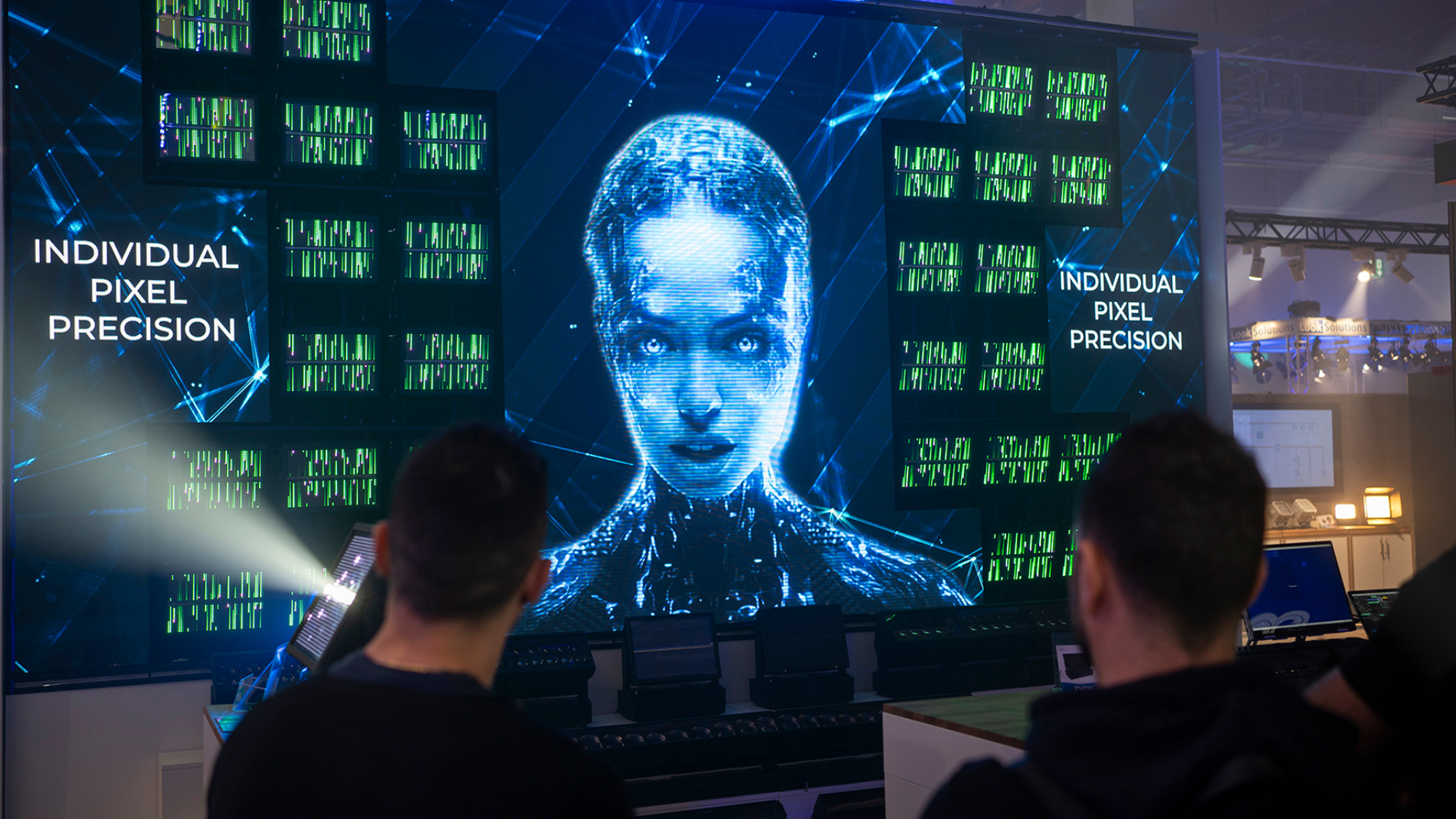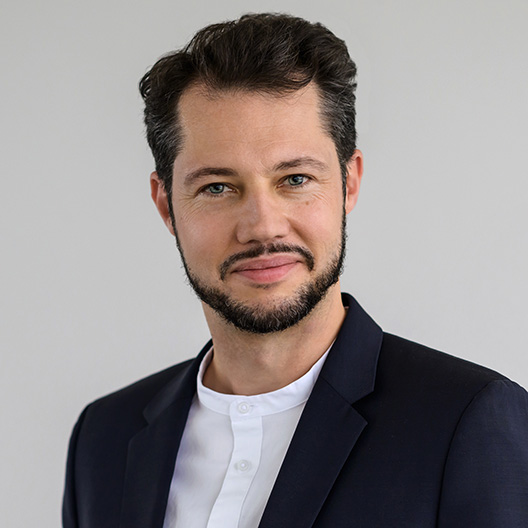A series of inspiring programme items dedicated to the influence of artificial intelligence on the event sector awaits trade fair participants.
Programme highlights on AI
On the Main Stage (Hall 11.0), keynotes by renowned experts will provide fresh impetus on this key topic. In ‘AI: The Stage is Yours’, Dr Uve Samuels will explain how AI is revolutionising the customer experience and how companies can develop their own AI products (8 April, 12:00 p.m.). In ‘Entertaining Change’, Sven Ortel will discuss, among other things, the fusion of AI, game engines and mixed reality with innovative storytelling (9 April, 12:00 p.m.). Vickie Claiborne will take a look at the influence of modern technologies such as AI on creative processes in ‘Empowering Creativity in the Age of Advanced Technology’ (10 April, 12:00 p.m.). In ‘From Data to Emotion’, Dr Steffen Ronft will show how AI technologies, in conjunction with event psychology, can be used to specifically address emotions (10 April, 4:00 p.m.).
At the Image Creation Hub (Hall 11.0, E05), a panel of experts will discuss legal challenges and perspectives around AI and copyright (9 April, 12:00 p.m.). Marko Massinger will present the AI-supported 4K HDR-PTZ camera OBSBOT TAIL, which automatically detects people and objects (9 April, 2:00 p.m.).
In the new special area MusicOneX (Hall 11.0, E50), producer and rapper Aufmischen will demonstrate in ‘AI in Music Production’ how AI can optimise composition and mastering processes (8 April, 12:00 p.m., Production Island). The talk ‘AI for Mobile DJs’ will convey insights into the opportunities and challenges of AI for DJs and their future role in the industry (8 April, 12:15 p.m., Mobile DJing Stage).
AI – Shaping the future of the event industry
The growing role of AI in the event sector is leading to a profound transformation – from automated work processes to new creative possibilities. The following article by Dr Uve Samuels provides an overview of AI trends, potentials and future-oriented developments.
AI as a driver of the event industry
AI can be used in a variety of ways in the event industry, for example to provide personalised attendee experiences, automate processes or create data-based services. Three key drivers are changing the way events are designed:
Personalisation means that every visitor receives offers that are tailored precisely to them. Whether it's a personalised T-shirt, a personal photo or even a video with a celebrity, the event becomes a unique experience based on the individual's personality.
Individualisation goes one step further. Here, products and experiences are tailored precisely to the needs of each individual. A good example is planning a customised trade fair route that is precisely tailored to the visitor's interests and preferences.
Finally, dematerialisation brings event experiences into the virtual world. Whether it's a meeting in the metaverse or the digital transmission of values such as intellectual property (IP), physical boundaries are blurring and new, innovative possibilities are emerging.
The event industry can decide: either to observe passively or to actively shape the future. That is a key question.

AI trends in the event industry
- AI in event planning
Automated customer interactions are of central importance: prospective customers can use chatbots to find out more about an event. Interested parties can also receive personalised recommendations.
In addition, AI supports the creative process in the conception of an event with ideas and at the same time increases efficiency in the planning.
- AI in the workplace
The automation of repetitive tasks relieves employees. Examples include informing event stakeholders about current changes in processes or the status of the event, such as controlling registration numbers or participants.
Furthermore, AI-supported communication improves customer service. For example, an AI can optimise the content and psychological structure of e-mails.
- AI for events and meetings
AI matchmaking connects participants based on their interests. This means that people with similar interests can be connected at an event, for example. An integrated singles exchange, carpooling or blind dates would be typical examples.
AI translation enables barrier-free events for international participants. An AI can simultaneously translate the text of media into 20 languages at once.
- AI for ideation and research
Generative AI aids content creation and event planning. Generative AI can be used to generate songs, graphics or videos, for example.
Data analysis provides valuable insights for optimising events. Evaluations of social media posts and e-mails or visitor flows, for example, can provide information about the success of an event.
- AI in event marketing & sales
The use of AI tools is of central importance for content creation, particularly for creating texts, images and videos for ever new and precisely tailored posts.
AI-supported targeting enables a personalised approach. By analysing the web using so-called crawlers, people and target groups can be identified and addressed with personalised stories.
In addition, AI solutions contribute to the optimisation of the sales funnel through dynamic pricing: the optimal price is determined for each person. By observing search behaviour, either special prices or special offers can be offered.
AI disruptors in the event industry
Various AI-driven platforms are already shaping the event industry:
- Gaming & e-sports: virtual events and community building (e.g. Fortnite)
- Streaming services: Netflix & Amazon Prime personalise content for users
- Event management tools: platforms such as Whova, Eventtia and Cvent support digital and hybrid events
- Virtual festivals: Brands like Jägermeister are investing in online events to reach their target groups
These disruptive changes show that AI has long since found its way into the event industry.
Artificial intelligence can optimise events in many areas and make valuable contributions. Three examples show how this works in practice:
Intelligent lighting design: AI can be used to efficiently control the lighting at an event. Machine learning algorithms not only optimise the placement of individual light sources, but also their adaptation to the course of the event – for a perfectly coordinated atmosphere in every situation.
Optimised sound: acoustics also benefit from AI-supported planning. Machine learning can be used to dynamically adjust the positioning and control of individual loudspeakers so that the sound is optimally accentuated in every phase of the event.
Interactive fan experiences: AI also makes it possible to reward concertgoers based on their social media reach. Particularly active fans could, for example, be given a short stage appearance or have their clips shown on the big screens at the event – a real highlight for the community.
The potential of AI for the event industry
AI can improve both analogue and digital events:
Analog Events |
Digital Events |
|
|---|---|---|
Support through AI |
An AI can help to optimise the entire planning of logistics and construction. |
Connecting people in an online event (e.g. a mentor and a mentee at a conference) can create a whole new experience. |
Jobs through AI |
For example, start-ups can be bundled together at their own exhibition stand at a trade fair. |
An avatar can read the input from the chats and implement it in a moderation. |
Through brainstorming and creative methods such as bisociativity (linking previously unconnected concepts), new AI-supported business models can be developed in every single company.
Developing your own AI solutions for events
The event industry can develop its own AI applications by going through the following stages:
- AI model: strategy, training and optimisation of AI systems
- AI product: developing real added value for customers
- AI business model: monetisation via B2B/B2C strategies
- AI start-up: scaling and expanding your own company
The Exponential Innovation Institute offers expertise and support for companies in this area.
- Conclusion and outlook
The event industry is only at the beginning of the AI transformation. Those who develop their own solutions at an early stage can benefit in the long term. AI enables hyper-personalised communication by analysing user data and automatically delivering appropriate content.
For AI to be successful, access to visitor data is required. The ‘Unidy’ development, for example, can collect user data from various services as a central platform and use AI for marketing and sales.
- Why AI will not replace human work
Despite all the progress, AI will not completely replace people in the event industry.
An important factor here is creativity. An AI can find new ideas based on patterns. However, humans can create something radically new and thus also use creativity outside existing patterns to create new solutions.
Other factors include empathy and relationships. Interpersonal communication based on feelings remains a unique human trait.
Another aspect is new job opportunities. It is an old debate whether AI destroys more jobs or creates more jobs. Many professions, such as doctors and lawyers, are under scrutiny. In the event industry, AI is certainly creating many new roles and job opportunities.
- Recommendations for companies
Companies should actively use the opportunities offered by artificial intelligence (AI) to strengthen their competitiveness and develop new business opportunities.
An important first step is to build skills and resources in a targeted manner. In-house learning and development teams that prepare employees for the AI transformation are particularly suitable for this.
In addition, companies should create their own structures for the integration of AI. The introduction of a dedicated role for AI experts is an essential first step in this process, in order to pool expertise and integrate it into the organisation in a targeted manner.
In addition, it makes sense to develop your own AI solutions and products. The ability to optimise internal processes using AI and to offer these solutions to external stakeholders or customers opens up additional sources of revenue.
Last but not least, continuous training of employees is essential. Re-skilling and upskilling through participation in hackathons and bootcamps can be a real game changer and sustainably strengthen AI know-how in the company.
- Final thought
AI is a revolution with long-term effects. The event industry has the chance to be a pioneer and establish itself as a driver of innovation. Those who use AI strategically can not only optimise events, but transform the entire industry.
About the author
Dr Uve Samuels is the founder and CEO of the Exponential Innovation Institute and co-founder of the AI start-up HUB in Hamburg. It has supported over 100 corporations and 100 start-ups in developing their new AI business model. He is also well-versed in the events scene and, as a keynote speaker and author in the events industry, is very well informed about current trends. Prior to that, he spent 13 years building up and managing the private university of Hamburg's business school, HSBA Hamburg School of Business Administration, as CEO.
Website: https://www.exii.eu/
Further Information about AI at Prolight + Sound 2025 at:
FutureScapes: Explore AI Trends in Events & Entertainment
Press information & images: www.prolight-sound.com/press
As an international trade fair brand, Prolight + Sound is present with events in Germany, China and Dubai. More about the global activities at www.prolight-sound.com/worldwide
Prolight + Sound
The Global Entertainment Technology Show for Light, Audio, Stage, Media + Event
The event will take place from 8 - 11 April 2025.
Accreditation for journalists:
The online press accreditation for Prolight + Sound 2025 is now available:
www.prolight-sound.com/accreditation
Please note the following information:
If you already have a Messe Frankfurt login, please use this access data to register.
We would like to ask you to update or complete your profile at this time.
If you are registering online for the first time and do not yet have an account, simply go through the registration process step by step.
In case of any further questions, please contact press.prolight-sound@messefrankfurt.com
Background information on Messe Frankfurt
Sustainability at Messe Frankfurt
